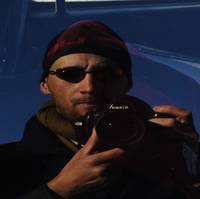Again, relating to a recent post on Lonely Planet's Thorn Tree message site about what vaccinations should be considered for Mongolia...
The main thing to realise re heath in Mongolia is that if something does happen you may be a long time away from good medical-aid or health care. Vaccination for some things may make the difference by giving you a few extra days to get back to UB or on to Beijing/Hong Kong etc for a real emergency.
Plague - rare in Mongolia. Anthrax is more common (that should stop a lot of people!). Neither is common enough to worry about.
Tetanus - get a booster if you haven't had one in the last 10 years, helps prevent infection in the event of an accident which gets dirt into the body.
Hep A - is spread via saliva so worth getting jabbed for if into communal eating/cooking/snogging. Not worth it for a short trip unless you are especially into these things!
Heb B - is spread mainly via blood so it's better to take the precautions (condoms, surgical gloves in your first-aid kit) than to get the jabs.
TB - spread via milk products and also close confinement to carriers (who may have no symptoms). Personally I'd recommend this if in Mongolia for a long time and eating/drinking a lot of dairy in the countryside or traveling on packed busses a lot. Infection rates apparently go up in winter.
Rabies - your choice. If bitten by a animal in Mongolia you should consider it rabid, as in a lot of the developing world. What you should do is capture the animal and it will be tested for rabies - this is commonly not possible so you have the choice of getting treatment or risking it. If you have the rabies pre-vaccination you will normally just need a booster if bitten. If you don't have the pre-vax you will need a much harsher course of injections that should really only be administered with an anti-toxin (available at major hospitals - ie not in the Mongolian countryside and possibly not even in UB). The pre-rabies vaccine is (or used to be - vaccines are changing all the time) a course of shots spread over weeks/months so you need to arrange it well in advance of travel. Personally I'd arrange the pre-vax jabs if you are a frequent traveler to developing countries, not just for Mongolia. BTW, if you are bitten by a rabid animal the first-aid is to wash the wound as soon as possible in alcohol (>70% if available). You can pick up small (10 ml?) blue bottles of medical alcohol at most pharmacists in UB and health clinics in regional towns/cities. Put a few in your first-aid kit.
Influenza - shots are hard to get in Mongolia as there is a big demand for them every winter. If old, seriously young or 'at risk' get a shot before you come.
Jumblina's point about carring antibiotics - some antibiotics can be useful for several things but to treat a specific virus a doctor needs to identify what the problem is and what drug best treats it. Resistance to antibiotics is on the rise and some local strains of virus in Mongolia have become drug resistant. Your doctor in Europe/N Ameraca etc may not be the best person to supply you with antibiotics and you probably won't be the best person to carry out a diagnosis and choose treatment. That said carrying something like doxycycline, which has a lot of different uses, could mean you have a 'quality product' available if the doc tells you to take it rather than getting a possibly suspect version.
I've never had a bad experience from countryside milk in Mongolia though visiting friends with guts not attuned to Asia have had interesting experiences (inversly I get one or two close calls everytime I visit Europe or North America these days). I also use the tap water in UB when brusing my teeth or when I've run out of bottled water at 3 in the morning. It tastes crap but is so heavily chlorinated it should be fairly safe.
T
PS - Not a doctor but 12 years of catching things in developing countries has taught me a lot. Better always to learn by other people's mistakes... ;-)
Subscribe to:
Post Comments (Atom)

1 comment:
Er, Antibiotics only work on bacteria, not viruses
Post a Comment